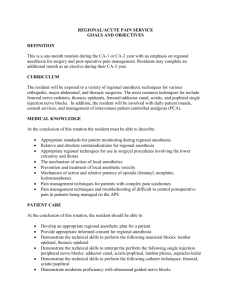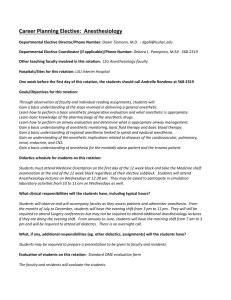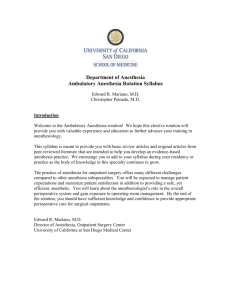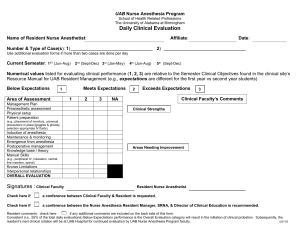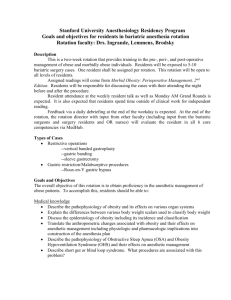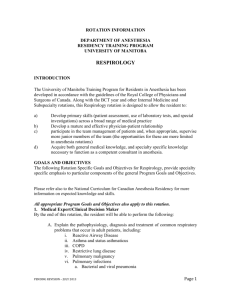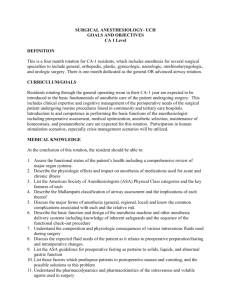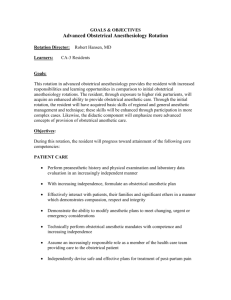Goals
advertisement
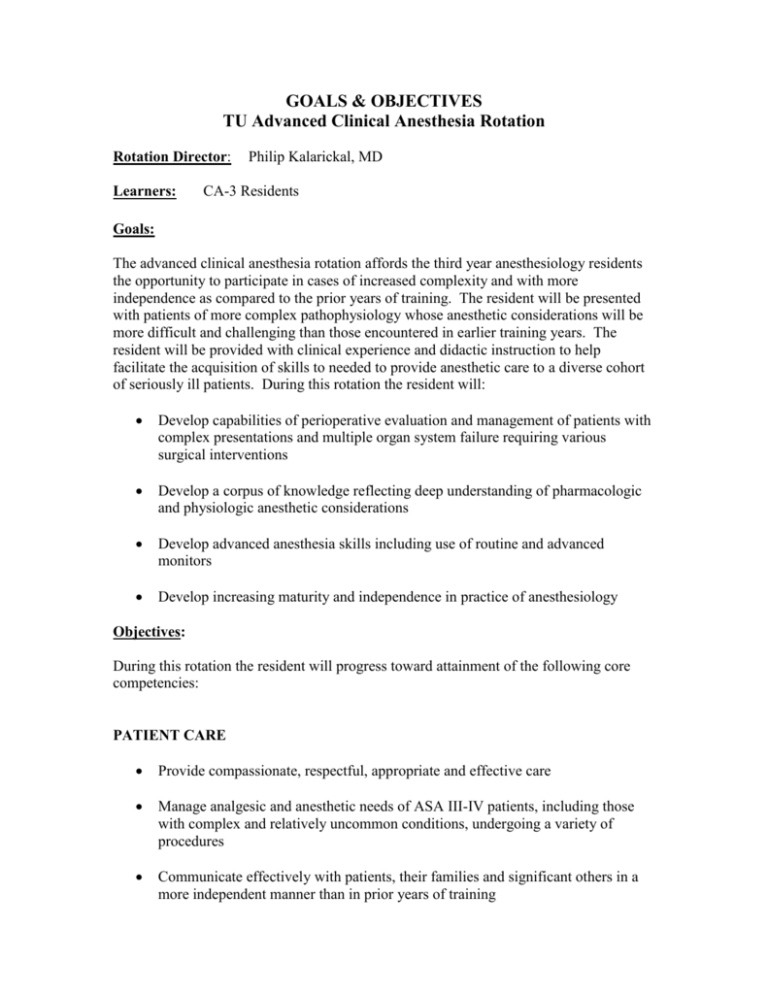
GOALS & OBJECTIVES TU Advanced Clinical Anesthesia Rotation Rotation Director: Learners: Philip Kalarickal, MD CA-3 Residents Goals: The advanced clinical anesthesia rotation affords the third year anesthesiology residents the opportunity to participate in cases of increased complexity and with more independence as compared to the prior years of training. The resident will be presented with patients of more complex pathophysiology whose anesthetic considerations will be more difficult and challenging than those encountered in earlier training years. The resident will be provided with clinical experience and didactic instruction to help facilitate the acquisition of skills to needed to provide anesthetic care to a diverse cohort of seriously ill patients. During this rotation the resident will: Develop capabilities of perioperative evaluation and management of patients with complex presentations and multiple organ system failure requiring various surgical interventions Develop a corpus of knowledge reflecting deep understanding of pharmacologic and physiologic anesthetic considerations Develop advanced anesthesia skills including use of routine and advanced monitors Develop increasing maturity and independence in practice of anesthesiology Objectives: During this rotation the resident will progress toward attainment of the following core competencies: PATIENT CARE Provide compassionate, respectful, appropriate and effective care Manage analgesic and anesthetic needs of ASA III-IV patients, including those with complex and relatively uncommon conditions, undergoing a variety of procedures Communicate effectively with patients, their families and significant others in a more independent manner than in prior years of training Goals and Objectives of the Advanced Clinical Anesthesia Independently perform preoperative history and physical examinations, and evaluation of laboratory data Provide anesthetic care utilizing specialized equipment and techniques including, but not limited to: double lumen endotracheal tubes, various fiberoscopes, various complex neurophysiologic monitors, transesophageal echocardiography, various cardiac output monitors, transcutaneous and intravenous cardiac pacemakers Develop an anesthetic plan in an increasingly independent manner for the spectrum of uncomplicated to complex, ill patients Effectively manage patients with difficult airways Manage patients with coagulopathies with increasing independence Perform regional anesthetic techniques in a competent and efficient manner Perform placement of peripheral and central venous, arterial, and pulmonary artery catheters in an independent manner Manage complex patients in post anesthesia care and intensive care units MEDICAL KNOWLEDGE Demonstrate advanced understanding of anesthetic considerations for patients with a variety of medical illnesses including but not limited to those referable to cardiac, pulmonary, renal, hepatic, neurologic, and endocrinologic etiologies Demonstrate advanced knowledge of pharmacology including knowledge of volatile and intravenous anesthetic agents, opioids, local anesthetics, muscle relaxants and reversal agents Demonstrate advanced understanding of aspects of cardiorespiratory, renal, hepatic, and neurologic physiology Demonstrate advanced understanding of fluid balance and transfusion requirements of patients presenting with complex pathophysiology Demonstrate knowledge of routine and complex monitoring devices and techniques Demonstrate advanced understanding of acid-base balance and positioning requirements of various complex surgical cases -2- Goals and Objectives of the Advanced Clinical Anesthesia Demonstrate an understanding of management of postoperative and postprocedural pain in a variety of seriously ill patients Demonstrate an understanding of the theoretical and practical management of cardiopulmonary arrest PROFESSIONALISM The residents will demonstrate increasing levels of commitment to professional responsibilities, adherence to ethical principles, and sensitivity to a diverse patient populations. Residents are expected to: Demonstrate a commitment to ethical principles pertaining to confidentiality of patient information, and the obtainment of informed consent Demonstrate proper sensitivity to patient needs and concerns Demonstrate sensitivity and responsiveness to the cultural, age, gender, and ethnicity considerations of patients, their families and significant others Develop behaviors engendering polite and respectful interactions with patients, families and all members of the health care team Understand importance of responding in a timely and appropriate manner to pages, requests for assistance, scheduling and departmental policies Understand the importance of the impact of non-professional comportment on various aspects of patient care and the health care environment Demonstrate an understanding of the requirements of life-long learning and excellence in scholarship Develop an understanding of the impact of business practices Understand importance of attendance and participation in varying departmental conferences and meetings SYSTEMS-BASED PRACTICE The residents will acquire an understanding of the necessity to appreciate the larger context of the health care system and the allocation of resources in a manner that promotes responsible patient care. Develop an understanding of how patient care is influenced by other components of the health care system -3- Goals and Objectives of the Advanced Clinical Anesthesia Develop and understanding of quality improvement programs Understanding the significance and ramifications of cost control strategies Understand the mechanism by which seriously ill patients enter the health care system and the experience the various components of the perioperative process Participate in processes leading to a greater appreciation of anesthesiology as it interacts with other aspects of health care Develop skills required to function in interdisciplinary environment PRACTICE-BASED LEARNING AND IMPROVEMENT The resident will learn to evaluate and improve patient care practices by application of the following: Demonstration of an understanding of avenues available to improve knowledge base and capabilities to treat complex patients Develop an understanding of desirability and necessity for life-long learning and the various options for achieving this goal Develop an appreciation of the importance of attendance of conferences, didactic lectures, morbidity and mortality conferences, journal clubs, local, regional and national meetings Develop an understanding of literature review and research design Develop an appreciation of how patient care may be continuously improved by acquisition of didactic and clinical knowledge and the application of constructive criticism Demonstrate behaviors that manifest an understanding of the above by willing and active participation in educational opportunities INTERPERSONAL AND COMMUNICATION SKILLS The resident will acquire and refine increasingly advanced interpersonal and communication skills through the following: Relationship establishment with patients, their families and significant others Appreciate the importance of effective communication with support staff to ensure maintenance of proper medication, equipment and supplies -4- Goals and Objectives of the Advanced Clinical Anesthesia Function effectively as a component of the patient care team Effectively exchange information with other health professionals involved in the care of the patient while remaining cognizant of patient confidentiality mandates Obtain information necessary for medical care of the patient from a variety of sources Develop effective listening skills Learn to recognize potential barriers to effective communication and develop strategies for proactive prevention of communication, interpersonal problems The acquisition of the above-elaborated core competencies will be facilitated by clinical assignments made by the attending faculty. As a result of these ongoing rotations, the will progressively demonstrate an incremental understanding of the principles of anesthesiology and demonstrate increasing competencies in performance of the technical requirements of patient care. As the resident progresses, an appropriate understanding of self-limitations will be a component of development of the requisite judgment required of a consultant in anesthesiology. The resident will be expected to complete reading assignments and other academic endeavors as mandated by the faculty. Independent study in addition to required readings is both desirable and recommended. The evaluative process for this rotation will be undertaken in concert with departmental evaluative policies. Residents will receive evaluations from faculty with whom they have worked and these evaluations include all core competencies. The evaluations are reviewed by the rotation director with the resident. The evaluations are signed by the resident and made available to the Clinical Competency Committee. The faculty are also encouraged to give residents ongoing verbal feedback about their performance of the core competencies on a daily or as needed basis. The departmental standardized evaluation form includes the six essential components of the core competencies: patient care, medical knowledge, professionalism, interpersonal and communication skills, practicebased learning and systems-based practice. The resident will evaluate the rotation as a component of the formal evaluative program process and will be encouraged to supply ongoing feedback on the rotation to the faculty and staff. They will likewise evaluate the faculty as part of the formal evaluative process of the teaching program. P. Kalarickal July 2009 -5-
